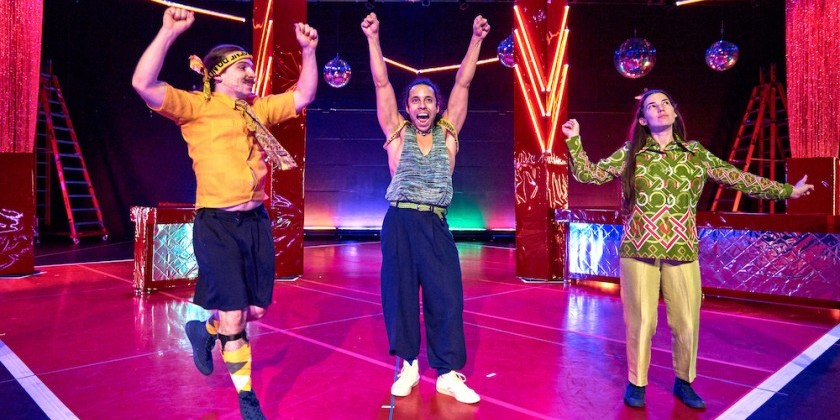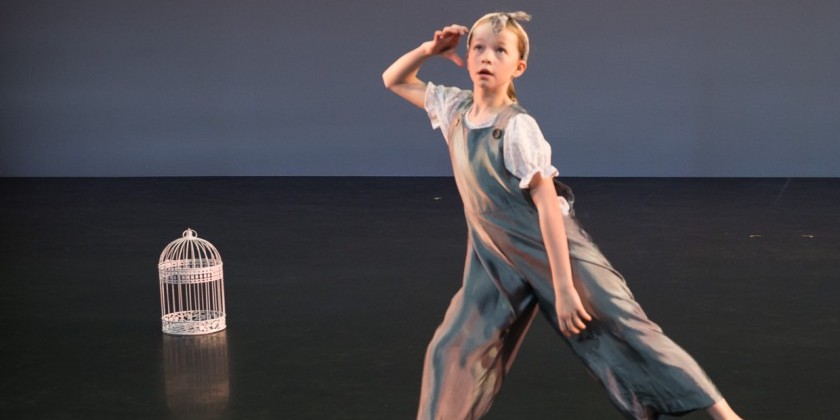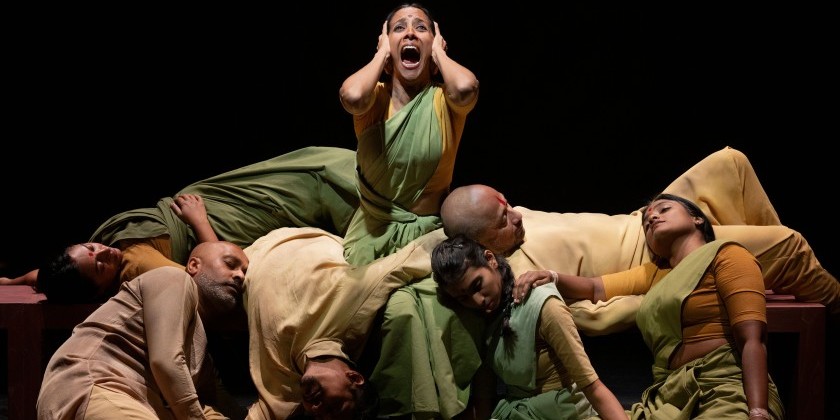IMPRESSIONS: "Wednesday" by Raja Feather Kelly/the feath3r theory at New York Live Arts

December 4th, 2021
Written, Choreographed and Directed by Raja Feather Kelly
Performed by Alexandria Giroux, Amy Hoang, Ashley Chavonne, Chris Bell, Claire Gieringer, Collin Kelly, Jordan King
Lighting Design by Tuce Yasak
Sound Design by Raja Feather Kelly
Set Design by You-Shin Chen
Cinematography and Video Editing by Laura Snow
Costume Design by Bandi Holt and Jordan King
The question of who gets to tell whose story is an idea of great interest to Raja Feather Kelly, director of the feath3r theory. His dance theater documentary Wednesday reimagines the 1975 film Dog Day Afternoon as a method to undertake this speculation. In his version, seven performers attempt to uncover the real-life story behind the movie.

The film was one of the first to feature a gay man as a protagonist and sticks relatively close to the actual narrative- two men rob a bank leading to a 14-hour standoff with the police. The hook is that one of the robbers, John Wojtowicz (played by Al Pacino) holds up the bank to get funds for his partner Leon’s (Chris Sarandon) gender-affirming surgery. Leon is portrayed as a gay man yet the character is based on a real-life trans woman, Elizabeth Debbie Eden. Her story is all but erased in the film. Wednesday attempts to give Eden a voice as it dismantles the original narrative and, through a series of reenactments, dance sequences, and conversations, puts it back together as a rumination on Kelly’s personal connection to Eden’s story.

Here is where things get tricky. Ruminations are by nature meandering, often unclear, and tangential. And that is just from the perspective of the person having them! To experience a cast of seven performers in a real-time meditation on their process is at times exhilarating, exhausting, confusing, and comical. As the performers argue about gender identification and hand out airplane bottles of flavored vodka, I search for glimpses of Eden. The protagonist In Kelly’s version, she appears, wearing silver roller skates and a sparkling sequined dress, in a cabaret act called “The Garden of Eden” at a nightclub called “Wednesdays.” Kelly’s fantastical interpretation, where music, movement and speech are inseparable, is inspired by numerous articles the performers recite bits of throughout the show.

When the non-linear nature of this storytelling becomes overwhelming, which it often did for me, there are other features to keep audiences grounded. The adjustable set of red columns and hanging disco balls by You-Shin Chen allows the space to transform from a bank, to rehearsal studio and cabaret club seamlessly. As a documentary on their creative process in real time, the cast infuses the production with confessionals about what they are doing: “I would never rob a bank, but I would certainly let someone rob a bank for me. Kelly’s wit serves as a pleasing anchor in my favorite interjection: “It’s very Madonna Blond Ambition” says one cast member in The Garden of Eden, “but I’m just trying to figure out the difference between a 1972 bank robbery and a 2021 Go Fund Me.”
 (starting from center front, l to r) Claire Gieringer , Alex Giroux, Jordan King, Chris Bell, Collin Kelly, Amy Hoang, and Ashley Chavonne in Wednesday by Raja Feather Kelly; photo by Kate Enman
(starting from center front, l to r) Claire Gieringer , Alex Giroux, Jordan King, Chris Bell, Collin Kelly, Amy Hoang, and Ashley Chavonne in Wednesday by Raja Feather Kelly; photo by Kate Enman
As the performers tell Eden’s story which is Kelly’s story, it become their story too, and the question of who has the right to tell it circles the evening like a bird searching for a place to land. But the turmoil and frustration evoked is essential to the core question itself: who does have the right to tell anyone’s story?

As the cast relates, there were times in the process when they declared Kelly, a queer black man, did not have the right to tell the tale of a white trans woman. While her story is not his in any concrete way, his connection to it is obvious and offers a glimpse into their shared experiences- disconnection, separation, loneliness. The core question raises more questions: Is recognizing your own hidden pain in the life of another ground enough to tell their story? Is the process of evoking identification in others more important than being bestowed permission?

Wednesday offers no answers, but as I put more distance between myself and the performance, I realize that contemplation is the point. As audiences engage with Wednesday it becomes part of their story too, and wrestling with these questions in community may open doors to underrepresented artists and ideologies that need the space to grow. Perhaps inclusion in the performing arts, and in society in general, comes not by decree but by engaging in difficult questions with no concrete resolution.












